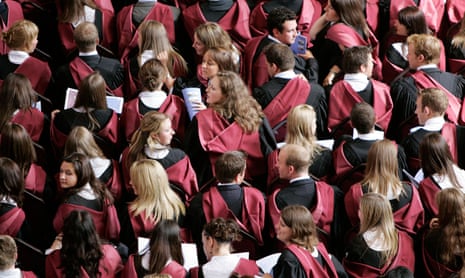Men are less likely than women to go to British universities, those who do are more likely to drop out and those who complete their course are less likely to get a good degree, according to a thinktank report.
Universities are being urged to set themselves targets to recruit more male students amid growing alarm about the widening gender gap in higher education.
One of the report’s authors said the underachievement of men in higher education was a national scandal and called on universities to focus funding for widening participation on young men.
The Higher Education Policy Institute (HEPI) report proposes a “take our sons to university day”, modelled on the success of “take our daughters to work” days, and the use of male role models in activities aimed at widening participation among under-represented groups in higher education.
However, the National Union of Students (NUS) criticised the report, saying it had taken a complex issue and turned it into “a battle of the sexes”.
The report, entitled Boys to Men: The Underachievement of Young Men in Higher Education and How to Start Tackling It, says the proportion of men entering UK higher education institutions is at a record low.
In 2015, the gap between the sexes was a record 9.2 percentage points, meaning women are now 35% more likely to go to university than men. By the January deadline for university applications this year, 94,000 fewer men than women had applied, according to the university admissions service Ucas.
The gender disparity is particularly acute among those from disadvantaged backgrounds, with young women who were on free school meals 51% more likely to go into higher education than comparable young men. Disadvantaged white boys are the least likely of all groups to go to university, with just 8.9% continuing their studies.
For young men who get to university, previously unpublished data from the Higher Education Statistics Agency (HESA) shows that 8% drop out of their studies, compared with 6% of women. HESA figures also show women outperforming men in terms of degree classification, with 73% of women getting a 2:1 or above, compared with 69% of men.
“I think it’s a national scandal,” said Nick Hillman, co-author of the report and an HEPI director. “Nearly everyone seems to have a vague sense that our education system is letting young men down, but there are few detailed studies of the problem and almost no clear policy recommendations on what to do about it.”
He acknowledged the challenges facing women in university and beyond, with female graduates earning less than their male peers, “lad culture” on campus and the poor promotion prospects for female academics.
“But policymaking is not a zero-sum game in which you have to choose between caring for one group or the other. Indeed, we can only tackle the socio-economic gap in higher education participation by focusing on the underachievement of young men, and particularly disadvantaged young white men,” he said.
Sorana Vieru, the NUS vice-president, said: “This report takes a complex and nuanced issue and turns it into a ‘battle of the sexes’. It obscures the socio-economic issues that impact young working class men’s progression after school into education and employment.”
She objected to the suggestion that female teachers were part of the reason boys did not do as well as girls at school, saying there was no evidence to support the claim.
Men continue to dominate subjects such as engineering and technology, physical sciences, computer science, architecture and mathematical sciences, while some of the increase in women’s participation in higher education can be explained by a shift to graduate entry for female-dominated careers such as nursing and teaching.
Earlier educational attainment is a key factor behind the gender disparity, the report says, with girls outperforming boys in primary and secondary education. It says boys “work less hard at school”, are more likely to play video games and spend time on the internet and are less likely to read for pleasure.
Another factor is that there is a greater financial incentive for women to go to university. Female graduates earn three times as much as women without a degree, while male graduates earn around twice as much as other men.
Jo Johnson, the universities and science minister, said: “While we are seeing record application rates from disadvantaged backgrounds, this report shows that too many are still missing out. That is why our recent university access guidance for the first time called for specific support for white boys from the poorest homes.”
Les Ebdon, director of the Office of Fair Access to Higher Education, said the low participation rate of disadvantaged white men was a “shocking and avoidable waste of talent” and urged universities and colleges to take action.









Comments (…)
Sign in or create your Guardian account to join the discussion